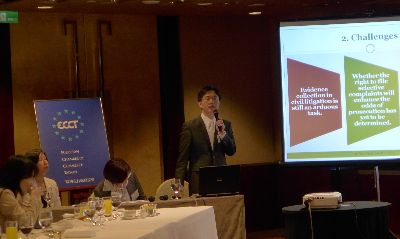ECCT Technology Committee Lunch: Update on Taiwan's Trade Secrets Act

The ECCT's Technology committee hosted a special lunch to update members on the 2013 amendments to the Trade Secrets Act. The event featured three presenters from the Tsar and Tsai Law Firm: Janice Lin, Partner; Vincent Wang, Integrated Partner & Yawen Yang, Senior Associate.
In January 2013 a number of amendments to the Trade Secrets Act (TSA) were passed into law that significantly beefed up the provisions of the original act of 1996. The original act lacked clout and changes were driven by the growing realization of the importance and economic value of trade secrets.
Before the 2013 TSA amendments, there were no criminal penalties under and only civil liabilities were available. Penalties were available under the criminal code but they were also quite lenient. For example, those found guilty of leaking industrial secrets could be imprisoned for up to one year while the offenses of larceny and breach of trust could face maximum prison sentences of up to five years.A famous example of how ineffective the law was prior to amendments occurred in 2011. In a case between two Taiwan technology companies (MediaTek and MStar), the Taipei District Court sentenced a former MediaTek employee to nine months in prison for leaking information to MStar although the sentence could be commuted to a fine of just NT$270,000. The former employee in question collected confidential business information from MediaTek just before he left the company and soon afterwards went to work for MStar. He then used the secrets downloaded to his personal notebook computer while working for MediaTek on to MStar.
Punishment in this case was unexpectedly light because the avenues for prosecution under the criminal code are limited and difficult or impossible to apply. For example, leaking industrial secrets was only punishable by up to a year. In addition, offenses against computer security, while punishable for up to five years, only applied to cases of break-ins or theft. In this case, the defendant used his own computer so this offense was not applicable. Moreover, the offense of larceny was not applicable because secret information is not regarded as a "thing" that people can steal. Finally, a breach of trust was not applicable because former employees are no longer "the entrusted" and thus no breach can be committed.
Evidence is hard to collect in trade secret offence cases. For civil litigations, no discovery procedure exists in Taiwan. Moreover, neither party is willing to submit evidence actively due to the concern of leaks. In criminal investigations, evidence is easy to destroy while the close cooperation and assistance of the victims are often needed. Moreover, offences are often committed outside Taiwan's jurisdiction. Enforcement is also ineffective. This is partly owing to a lack of awareness. Stealing trade secrets is commonplace and investigators and judges often do not realize the value of trade secrets and the damage inflicted if they are stolen. Another serious problem is that offences are often committed off-shore, which makes it very difficult to prosecute given that Taiwan's criminal code is unlikely to be enforced outside of Taiwan.
The 2013 amendments have resulted in four main improvements. It is now an illegal, punishable offense to:
- Acquire a trade secret by illegal means or use or disclose an illegally acquired trade secret
- Reproduce, use or disclose a trade secret without or beyond authorization
- Fail to delete or destroy a trade secret when so instructed by the trade secret holder, or further hide the trade secret
- Knowingly acquire, use or disclose a trade secret that is acquired by others in illegal ways.
Penalties for those found guilty of any of the above offenses include imprisonment for up to five years and fines of NT$1-10 million and up to three times the illegal gain if the illegal gain exceeds NT$10 million.
Complaints of victims are required to initiate prosecution but these complaints can be filed selectively. This means that victims may file complaints against any of the co-offenders in a case in the hope that some co-offenders may consider cooperating with an investigation to avoid indictment. However, selective complaints are not applicable to offshore violations.
Another new feature of the law is that employers may be fined if any violation is committed by employees, agents or representatives when performing their duties unless they can demonstrate that they made a sincere effort to prevent the crime.Given the risk of substantial liability, employers would be well advised to take action to protect themselves by adopting a no-tolerance policy towards using other's trade secrets, educating employees about the new law and updating all their administrative and legal documents and procedures to bring them in line with the law and to safeguard their own trade secrets.
While the 2013 amendments have greatly improved the legal protection of trade secrets, there remain a number of challenges: 1) It is very difficult to enforce the law related to off-shore violations; 2) It is too soon to say whether the right to file selective complaints will enhance the odds of prosecution or if this avenue may be abused (eg for blackmail and extortion) and 3) Collecting evidence for civil litigation cases is still an arduous task.
